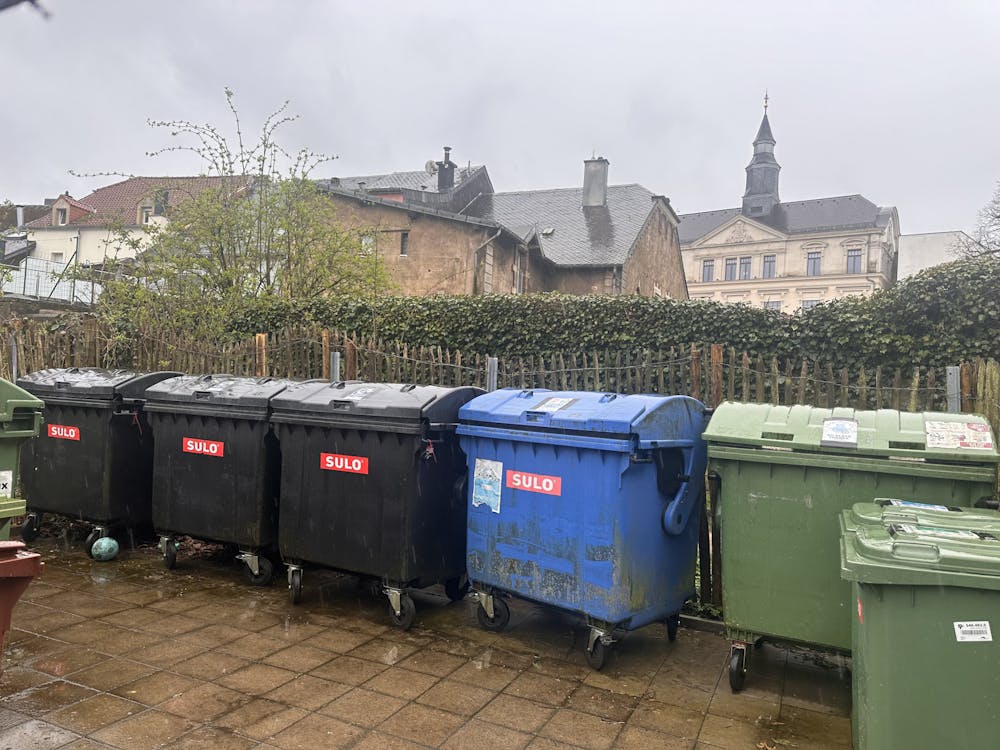Where trash goes and how to dispose of it are probably not the main concerns on a student’s mind when they go abroad, but they can make a big impact.
At Miami University’s John E. Dolibois European Center (MUDEC) in Luxembourg, waste is handled differently than in Oxford. Just outside of the Château de Differdange, where MUDEC’s home base is, student waste is meticulously sorted into several dumpsters, each devoted to a specific type of waste.
Plastic waste is sorted into green dumpsters, organic waste (e.g. food scraps) in smaller green dumpsters, cardboard and paper products in blue dumpsters and glass products in brown dumpsters. While this sorting is mostly done by MUDEC staff, students often help with sorting their waste inside the château by tossing their waste into either recycling or trash bins.
While in Europe, students may also live with host families. For these students, they not only experience specific waste management on campus, but also at home. Zoey Rollo, a sophomore marketing major and current MUDEC student, reflected on her experiences with waste management abroad.
“Before going abroad, waste management never really crossed my mind,” Rollo said. “But after coming here and really figuring out how it works, it became more of a concern.”
Rollo also emphasized the differences between waste management in Luxembourg and Ohio.
“In Oxford, people don’t care,” Rollo said. “They’ll take their plastic container and toss it in the trash when they can recycle it. But here, there’s a lot more social pressure to do the right thing.”
The pressure to correctly dispose of waste in Luxembourg is not just a social pressure, but also a legal one. If a household doesn’t sort its waste correctly, it will be refused collection and forced to re-sort its waste for the next collection. This waste management enforcement can cause a household’s waste to pile up over time if it keeps on repeating the same mistakes.
While this system may seem extreme, especially in comparison to the United States’ waste management, Luxembourg is not the top EU country in terms of waste management (ranked 21 out of 28 in 2017 in terms of plastic recycling). However, Luxembourg has been taking recent steps to climb its way up the ladder of sustainable waste management.
For example, its 2022 Waste Act placed a ban on single-use plastics that has been enforced since the start of 2024. Additionally, this act has obligated restaurants to use reusable products like containers and cutlery. This move toward using only reusable products in a dining setting is seen at MUDEC with the château only using reusable dishware.
This act has brought about tangible progress, especially in collaboration with the 2021 expansion of what products can be recycled, spurred by Luxembourg’s Valorlux household recycling system. According to a Luxembourg Times article, since this expansion, recyclable packaged product collections have risen 33%.
Learning about this progress and gaining new experiences with waste management have opened some MUDEC students’ eyes to the positives of more meticulous waste management in Europe, including sophomore accountancy major Kaleigh Kuhns.
Enjoy what you're reading?
Signup for our newsletter
“I actually believe the recycling is getting recycled here,” Kuhns said. “While back in the U.S., everything is in one big bin so we don’t really know where it all goes.”




